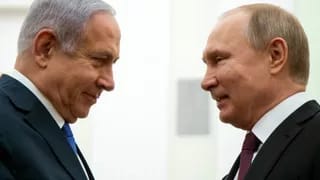For decades, Moscow played a masterful double game in the Middle East: courting Tehran and Damascus, preserving a military foothold in Syria, deploying private contractors across the region, and simultaneously keeping channels open to Israel and Gulf capitals. That delicate balancing act is now fraying, and much of the credit belongs to one small country that refuses to be boxed in: Israel.
Over the past year, Israel has taken a series of bold, kinetic and diplomatic steps that have dramatically complicated Russia’s calculus in the region. Surprise strikes on Iranian targets, audacious attacks that even grazed the Gulf’s diplomatic balance, and hard-nosed diplomatic engagement with both Washington and regional Arab capitals have made clear that Israel will no longer be a passive bystander in theaters where Russian and Iranian interests intersect. Those strikes and the diplomatic fallout that followed have forced Moscow to scramble to re-evaluate its assumptions about how much influence it can project without risking escalation.
Consider the diplomatic shockwaves after Israel’s recent actions beyond its borders. Israeli operations have spilled into arenas Moscow long treated as its preferred turf. The strike that hit Doha and prompted high-level diplomatic repair, including a mediated conversation with the US president and a rare Israeli apology, was a stark illustration: Israel can and will strike where it judges vital interests lie, even when the diplomatic cost is high. That willingness to act unilaterally upends predictable regional bargaining and weakens the presumption that Moscow calls many of the shots.
Russia’s response has been telling. Publicly, Moscow has leaned on fierce rhetoric, warning of destabilization and accusing Israel of “blowing up” the region, while privately racing to hold its existing relationships together. Phone calls between Putin and Netanyahu, urgent Kremlin messaging, and sharp statements from senior diplomats show a country aware that Israel’s new posture makes Moscow’s influence more brittle and more expensive to defend. In short, what used to be low-cost influence is becoming high-maintenance.
But let’s be precise: Israel did not, cannot, and should not be credited with single-handedly “ending” Russian influence overnight. Moscow still commands military assets in Syria, maintains energy and political ties across the Arab world, and operates influential private military actors in several theaters. What Israel has accomplished, however, is more strategic and subtle: it has punctured the myth of inexorable Russian ascendancy in the Levant and forced Russia into defensive realignment.
How will historians remember this moment? There are two competing narratives in formation. One will cast Israel as the decisive spoiler – the small but strategically nimble actor that denied Moscow a free hand to remake the Middle East. In this telling, Israel’s strikes and diplomacy bought breathing room for American and Gulf interests, prevented a deeper Russian-Iranian dominion in key theaters, and reasserted the limits of Moscow’s reach. It will be remembered as the point when geopolitical momentum swung away from a multipolar scramble and back toward US-aligned blocs, with Israel as the wily gatekeeper.
The rival narrative will argue that Israel’s tactics simply provoked a reactive Moscow, one that doubles down elsewhere, deepens ties to Iran, or leverages asymmetric tools to regain influence. In that version, Israel’s hard power made the short-term headlines but sowed seeds of future pushback, forcing a longer, messier contest where neither side clearly “won.” Both narratives contain truth; the final verdict depends on choices that will be made in capitals from Washington to Riyadh to Moscow over the next several years.
For Americans and Western policymakers, the takeaway is straightforward and urgent. If Israel’s actions have, even temporarily, blunted Russian designs, the West must capitalize, not congratulate and withdraw. That means buttressing regional partners, integrating Israeli intelligence into broader Western strategies, and offering a diplomatic architecture that rewards friends and isolates spoilers. If the West fails to convert tactical advantage into strategic gain, Moscow will regroup, and history will recall this as only a pause, not a defeat.
The map has changed. The question now is whether the architects of Western policy will redraw it in time.
Amine Ayoub, a writing fellow with the Middle East Forum, is a policy analyst and writer based in Morocco.

